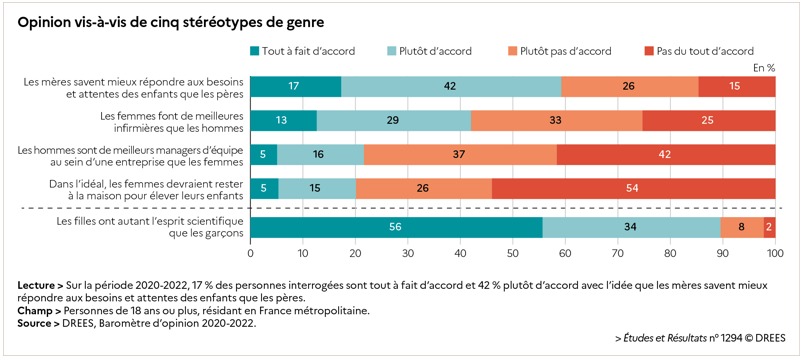Published on
Updated
Reading 3 min.
Girls are bad at math, but become mothers who are more attentive to the needs of their offspring, and that’s a good thing, because they (still) have a great interest in staying at home to take care of them. So many stereotypes that the French are slowly but surely beginning to reject, with a few exceptions, if we consider that they remain anchored within certain sectors of the population, particularly among men.
They are often born in the playground, and intrude into minds until they impose themselves as a certain normality, crossing the ages and thus contributing to annihilating any action in favor of true equality between men and women. Sexist clichés, whatever they may be, definitely die hard, even if mentalities are progressing on the subject. This is what comes out from the last barometer of the Department of Research, Studies, Evaluation and Statistics (DREES) on gender stereotypes and inequalities within couples. This face-to-face survey of a sample of 4,000 people aged 18 or over, in 2020 and 2022, shows a rejection of some of these stereotypes, but not within the entire population.
Rejected by one in two French people
More than one person questioned as part of this survey in two rejects gender stereotypes, indicates the DREES which specifies having created “an indicator making it possible to differentiate the degree of adherence of [sondés] to these stereotypes taken as a whole” on the basis of five questions. In detail, four out of ten respondents (41%) are however “moderately opposed” to these sexist clichés, and 13% strongly reject them. But the survey also state of 26% of French people who adhere to these gender stereotypes, including 16% in a moderate way and 9% in a marked way. And we see through this data that certain clichés of (this) genre do indeed die hard .

Nearly six in ten French people (59%) agree that mothers are able to better meet the needs and expectations of their children than fathers, including 17% who say they completely agree with this idea. More than four in ten respondents (42%) also believe that women make better nurses than men, but ‘only’ 21% and 20% of the panel believe that men are better team managers and that women should stay at home to raise their children, respectively. As for the non-propensity of girls to have a scientific mind, the French reject this preconceived idea massively, up to 90%.
Men lagging behind
The DREES survey also sketches the portrait of the French people most inclined to adhere to the aforementioned gender stereotypes: being a man, being over 65 years old, having a regular religious practice, “Having little or no education, or being an immigrant, would increase this probability,” we can read in the barometer. And if we look at the data presented, the “strong adherence” category to these clichés includes twice as many men as women. And these gentlemen are at the same time less numerous in the “total rejection” category, 10% compared to 15%.
Another lesson and not the least, inequalities within the couple also die hard. The survey reveals that more than one in two women (54%) say they take care of household chores alone – or almost -, namely shopping, laundry, or cleaning. A figure which plummets to 7% among their male counterparts. The finding is the same for activities and other tasks relating to children, such as meals, leisure, and education, at 46% for women, compared to 6% for men. “The more people adhere to gender stereotypes, the less they report egalitarian sharing in their relationship,” we can read in this report, suggesting that clichés can influence the sharing of tasks, or more broadly equality between men and women. , within the home.
To discover the entire DREES barometer: www.drees.solidarites-sante.gouv.fr.
